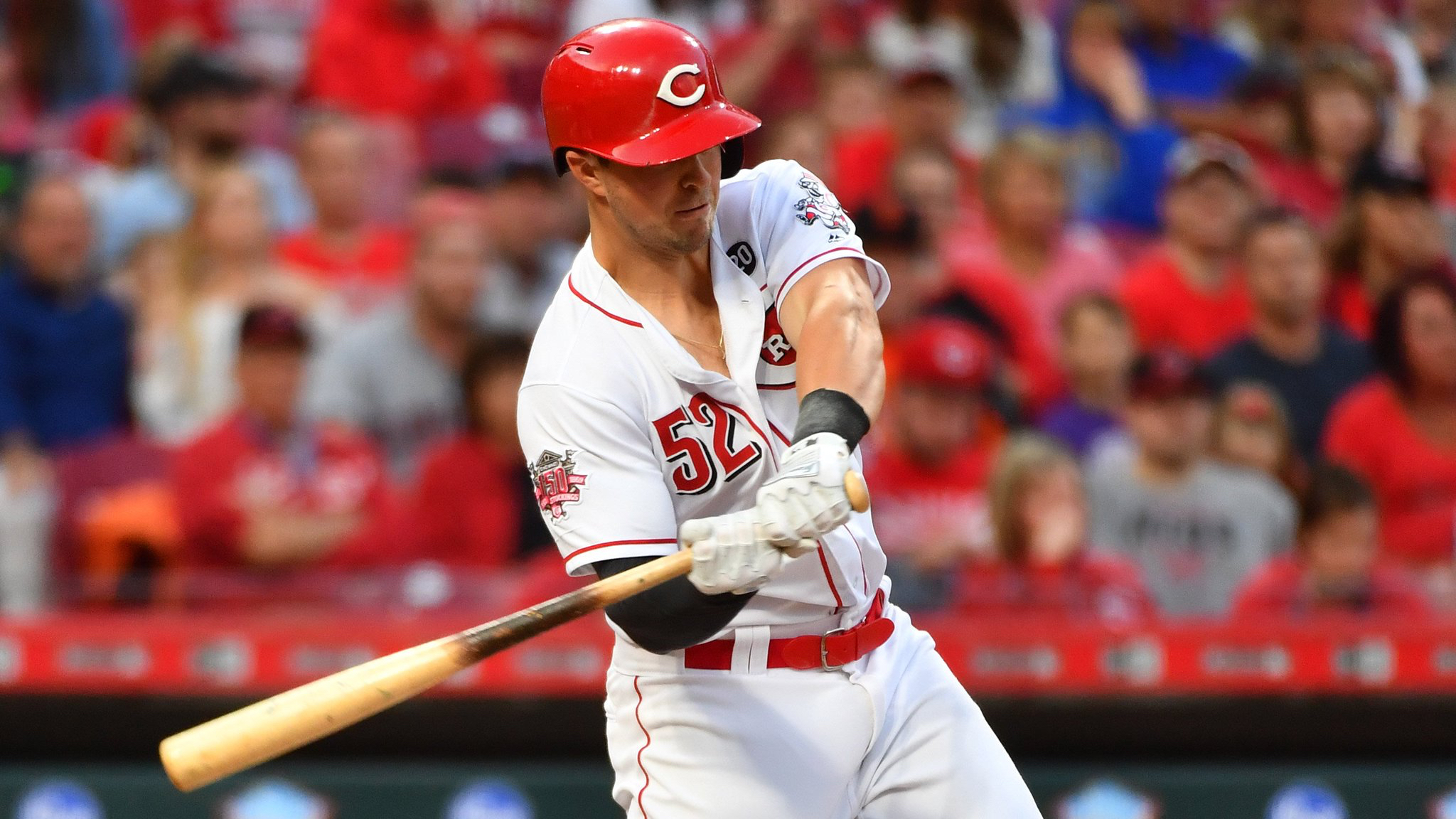
Kyle Farmer is the type of player every MLB team needs on its roster. The ability to play nearly every single position is priceless – just what Farmer offers. In 2019, Farmer was the ultimate utility man for the Reds playing every position besides outfield, even pitching 1.1 scoreless innings. In total, he played:
- C – 81.2 Innings;
- 1B – 72.0 Innings; -23.1 UZR/150
- 2B – 270.2 Innings; 0.5 UZR/150
- 3B – 60.2 Innings; 23.3 UZR/150
- SS – 1.0 Innings;
While Farmer will remain their go-to utility man, his role for the Reds may be expanding. After the offseason exits of Jose Iglesias and Jose Peraza, the Reds resigned Freddy Galvis to become the starting SS. After much speculation of acquiring Didi Gregorius, Carlos Correa, Francisco Lindor, and even Xander Bogaerts most recently, Galvis still remains the Reds SS (See Spenser Brown’s post on Galvis).
The question arose: Who would be the backup SS to relieve Galvis for days off or an injury?
It didn’t take long to get an answer. Manager David Bell said he was confident in Farmer to fill this role. At first this is alarming since Farmer only played one inning at SS last year. Yet, everyone seems to have forgotten, including myself, that Farmer was a 4-year starter at SS for the University of Georgia in college.
As a shortstop, Farmer was named the 2010 Louisville Slugger Freshman All-American as chosen by Collegiate Baseball newspaper. In 2012, Farmer was the starting shortstop for the USA Baseball Collegiate National Team. In 2013, Farmer was drafted by the Dodgers and remained with them until he was traded to the Reds last offseason in the Bailey/Wood/Puig trade. Throughout the minors Farmer played primarily catcher totaling 2782.0 innings with only 75.1 innings played at shortstop but with 58.0 at SS coming in 2018. Despite a small sample at SS, he impressed with a 1.000 fielding % throughout the Minors.
Bell stated “I think people underestimate how he plays that position. I would have no hesitation having Kyle play an extended period of time at short,” per Mark Sheldon at MLB.com. Bell’s trust in Farmer is reassuring, as well as Farmer’s confidence in himself. Farmer wanted to make it clear to everyone saying “I’m not a catcher playing shortstop. I’m a shortstop who can play catcher,” when he was asked by the media about Bell’s comments at spring training.
With extra work in spring training and his past history, fans and the front office should have no worries about Farmer playing shortstop. His fielding statistics from last year, as shown above in UZR/150, also support his case as an average fielder at all infield positions possibly with his best position being at 3B (23.3 UZR/150).
In 197 plate appearances in 2019, Farmer hit 0.230/0.279/0.410 with a 0.284 BABIP and 73 wRC+. While these stats aren’t great, Farmer saw a big increase in time in the Majors from 2018 where he only got 77 plate appearances with the Dodgers and 20 in 2017. Much of his struggles can still be accounted for by adjusting to major league pitching. Various projections have Farmer ranging from 49 to 317 plate appearances for the upcoming season, but they all seem to hover around a 0.235/0.285/0.375 line. While 317 plate appearances may be an overshot, I think 200 is more reasonable – that includes an average 6 to 10 games of relief for Suarez, Moustakas and Votto, and 10 to 15 games for Galvis.
Farmer won’t be a big producer for the Reds in 2020 and he doesn’t need to be. His position is a role player, not to hit 40 HRs with a 0.350 OBP and 130 wRC+. If Farmer comes off the bench and is a plus-hitter, which he may do, then it is just an added bonus to the Reds. The Reds infield is not nearly as deep as their outfield, so production will be mainly from the everyday starters.
Assuming no additional moves to get an infielder, the Reds will depend on Kyle Farmer to play extended time as a backup infielder, particularly as the backup shortstop for Galvis. Farmer isn’t the All-Star off the bench, but there’s comfort knowing he’ll be a reliable player for the Reds as a fielder and hitter.
[Featured image: https://twitter.com/Reds/status/1154459459864842241]



I like Farmer’s versatility, although I kinda wonder if making him the primary backup at shortstop — and maybe the only other shortstop on the roster — cuts into the Reds’ maneuverability regarding pinch hitting for the catcher or double-switches or whatever.
Farmer’s ability to play all of the infield positions and catch cannot be overstated. It makes him more of an asset to have on the bench than say an extra outfielder or VanMeter, who might be better hitters. He’ll still play a role in double switches but likely only switching for Galvis – no sense in taking Suarez, Moose, or Votto our late in a game.
‘If Farmer comes off the bench and is a plus hitter…’ That line is the key; otherwise, he is a less than ideal backup (to a less than ideal starter) for a team that wants to compete with deep teams for a playoff spot. I like Kyle and his style, willingness to play anywhere at any time, and the value of a decent third catcher who can do other things, too, but in looking at his hitting production in the majors and upper minors, it seems unlikely that he can move his wRC+ up to that 100+ level. A strong 26 man roster would have him hitting regularly in Louisville.